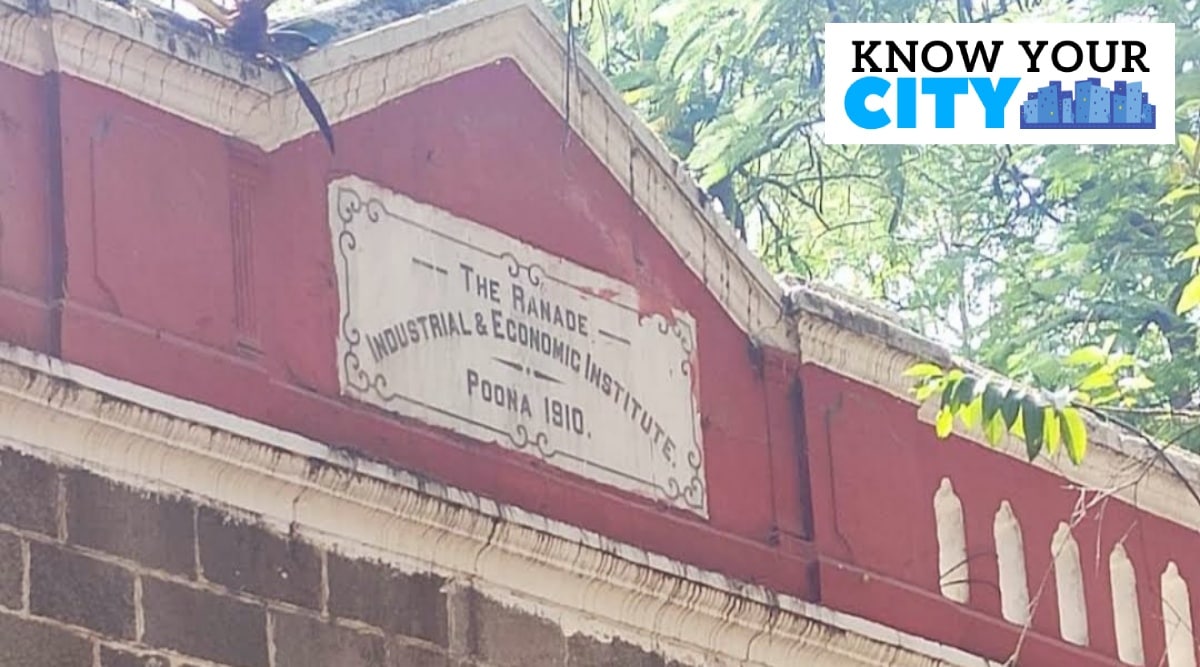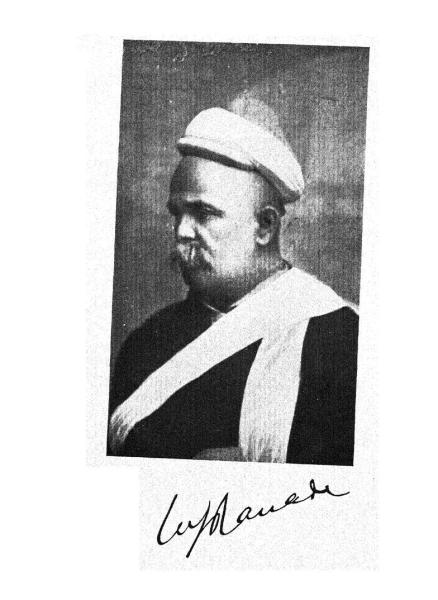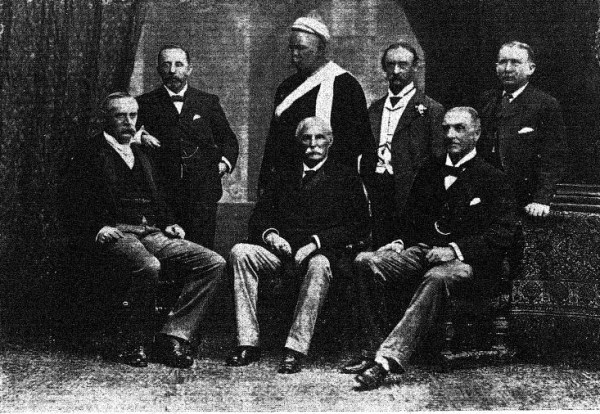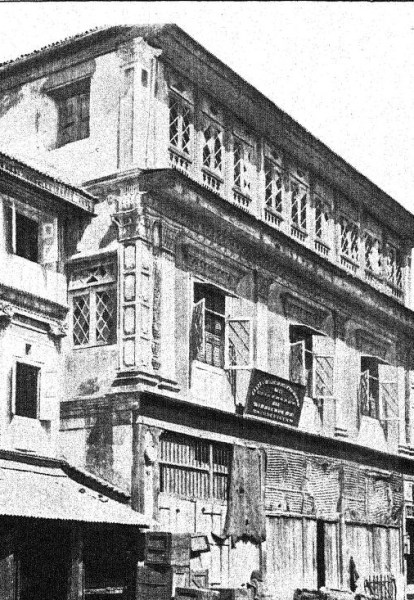 Ranade Institute budding that houses SPPU's journalism department
Ranade Institute budding that houses SPPU's journalism department Under the shade of a canopy of trees is the Ranade Institute Building on the Fergusson College road. The Institute today houses the University of Pune’s Department of Communication & Journalism and the Department of Foreign Languages, in a new building adjacent to it.
In the early 1900s, politician and reformer Gopal Krishna Gokhale had an objective to start an industrial and economic institute in honour of his mentor — Justice Mahadev Govind Ranade. Gokhale, one of the great men of Indian public life, was introduced to Ranade when he was 21, and there existed between the two a close association.
Built in a colonial vernacular style, Gokhale’s concept for the then Ranade Industrial and Economic Institute was to promote the spread of industrial, technical and scientific knowledge, a vision he inherited from Ranade.
After the establishment of the Servants of India Society in June 1905, Gokhale received the land from the Shiroles, a well-known political family, on a 99-year lease that began in 1910.
“D.B. Limaye, a chemist who worked on different problems of industrial importance and institutionalised chemical research in Maharashtra, was employed at the institute in 1911 by Gokhale. He was also the director from 1912 to 1940. From 1930, under Limaye’s direction, the institute started admissions for postgraduate students. In 1949, however, the institute and its administration were handed over to the newly formed University of Pune. The Servants of India Society subleased the land to the University from 1968 to 2005”, writes Sahapedia, a cultural mapping project of Pune.
 Justice Mahadev Govind Ranade.
Justice Mahadev Govind Ranade. In 1956, an endowment of Rs.10,000 made by K A Kolhatkar and the acceptance by the University of Pune for instituting the “Sandeshkar Kolhatkar Scholarship” for Marathi Journalism, established the beginnings of the Department of Journalism in the building, reads the department’s profile on the official University website.
Ranade – A child from Niphad who became Bombay HC judge
Rao Bahadur Mahadev Govind Ranade, popularly known as Justice Ranade, was a man who wore many hats — of a judge, economist, social reformer and a prolific author and played a pivotal role in shaping modern Maharashtra. “The last three decades of the 19th century may be called the ‘Ranade Age’ in Maharashtra. One of the most stupendous figures produced by Maharashtra in modern times, he distinguished himself as a scholar, jurist, economist, politician and a man of vision. He was the originator of several institutions that played a significant role in social life not only in Maharashtra but also in India. A man of versatile genius, his activities embraced various aspects of life,” writes B R Sunthankar, describing Ranade in Nineteenth-Century History of Maharashtra: Vol. 1 (1858-1920).
“Ranade was essentially a son of his age. He built his inner life out of the deeper urges and the finer aspirations of his time,” writes James Kellock in his book Mahadev Govind Ranade – Patriot And Social Servant, 1926.
Born on January 18, 1842, in Niphad, Nashik, Ranade began with reading, writing and arithmetic, and began to learn English in 1853. He completed the education of roughly the matriculation standard by the end of 1856 when he began to entertain ideas about going to Bombay for further studies.
Ranade had enrolled himself at the Elphinstone Institute in 1857, the year when the Sepoy Mutiny broke. He was one of the first graduates and an Indian fellow of the Bombay University, which was formally inaugurated in the same period. By 1864, Ranade completed his MA and two years later, his degree in Law. In 1866, he was also appointed as the Oriental Translator to the Government of Bombay. In his own words, for the period between 1863-64, he was working “in four different capacities – a college tutor, as a law student, as a private student and a university examiner,”
He was later a professor of English and History at the Elphinstone College in 1868. In 1871, he passed the Advocates Examination, and shortly afterward he was appointed a subordinate judge by the Government of Bombay and was sent to take up duty at Poona (now Pune). He moved up the ranks as a judge and in 1885, became a member of the Bombay Legislative Council. It was not until 1893, he became a Judge at the Bombay High Court. Due to his constant run-ins with the then British administration owing to his political and social work, his promotion was delayed.
 Ranade with his fellow judges at Bombay High Court.
Ranade with his fellow judges at Bombay High Court. Ranade’s social endeavours shaped Maharashtra’s renaissance
In the year 1862, Ranade began his career as an editor with the Anglo – Marathi periodical published from Bombay established by Vishnu Parshuram Pandit in 1862. He wrote on a lot of topics but it was his advocacy for widow remarriage that put him in focus. “… But three years after this journal was started, there was founded an association for the specific purpose of encouraging widow marriages,” writes T V Parvate in his book Mahadev Govind Ranade – A Biography.
Ranade founded the Widow Remarriage Association in 1866 with Vishnushastri Pandit and G H Deshmukh. Parvate further writes that the movement happened to be only a spear point of the general campaign for the women’s liberation movement, “Ranade was engaged in writing to educated people in various centres in Northern India about these developments and enlisting support to the cause of widow marriage on an all-India scale,”
However, in October of 1873, his wife, Sakhubai died from Tuberculosis. Ranade’s close friends expected him to re-marry to a widow and so did his father. His father, an orthodox man, to prevent a family catastrophe, arranged his marriage to 11-year-old Ramabai. Ranade tried to stay firm to his principles but failed to win the arguments with his father. Despite that, Ranade became a teacher to his child-wife and educated her. In later years, Ramabai not only worked towards women’s emancipation but also ably carried the banner of social reform after her husband’s demise.
The arrival of Ranade to Poona in the year 1871, marked a new epoch in the history of the city, hereafter which it became the main stage of action.
“When Ranade came to Poona, he found that there had been inaugurated there in the previous year a society called the Sarvajanik Sabha. The object of the society was to represent to the Government the needs and the wishes of the people…Ranade found in this society a means of expression for that social conscience that burned within him, and a good instrument for furthering his purposes. He became a member immediately after he arrived in Poona, gathered the reins of its affairs into his own hands, and for the following twenty-two years was the life and soul of it. The founder of the Sabha was Ganesh Vasudev Joshi-affectionately called Sarwajanik Kaka – and he and Ranade worked for, hand in hand, Joshi being the executive power in the society and Ranade the brains. The Sabha played a very important part in the awakening of Western India, and in creating a public opinion upon political, social, and economic matters,” writes Kellock.
In the continuum of his far-sighted vision in improving the status of women, Ranade alongside R G Bhandarkar, Shankar Pandurang Pandit, Vishram Ramaji Ghole and Vaman Aabaji Modak established the Maharashtra Girls’ Education society on October 2, 1884. “It was indeed a milestone in girl’s education. Following the direction given by the social reformist Mahatma Jotirao Phule and his revolutionary wife Savitribai, M. G. E. Society took the lead and established Huzurpaga, the second school for girls in Maharashtra. Their vision was to introduce modern education to Indian girls which will enrich and empower their lives,” reads the Huzurpaga Mahila Vanijya Mahavidyalaya official website.
“The number of institutions that Ranade helped to found during the period following immediately on his persecution is a good indication of his expanding influence for good,” writes Indian economist and professor D.G Karve in his book Ranade, 1942.
Ranade’s aim to better Hinduism without making it lose its essence led him to also get associated with the Prarthana Samaj, after his arrival to Poona. He was a staunch supporter of Swami Dayanand Saraswati and he invited him to Poona to arrange a series of lectures. “He felt that Dayanand’s ideas on social and religious reforms would serve as an encounter to the orthodox faction in Pune,” writes Sunthankar.
 Sarvajanik Sabha building in Poona.
Sarvajanik Sabha building in Poona. An economic reformer
Ranade regarded dependence upon the single resource of agriculture, as the chief cause of India’s poverty. In his work ‘Essays on Indian Economics’, he wrote: “We have been all along, like most ancient nations, more or less exclusively agricultural. But our contact with the world outside, and the freedom of exchange which has resulted in consequence, have produced one most undesirable result. They have aggravated the situation by making us more than ever dependent upon a single and precarious resource. The industry and commerce of the country…is passing out of our hands…Foreign competition, not because it is foreign, but because it is the competition of nature’s powers against man’s labour… competition of organised skill and science against ignorance and idleness, is transferring the monopoly not only of wealth, but of skill, talent, and activity to others.”
Ranade was a strong believer in taking steps to encourage industrialisation in India. In 1875, he came up with the Spring Lecture series to impart the masses latest knowledge available, particularly on politics and economics. In 1890, he organised the Industrial Association of Western Indian in Poona. The conference was held annually during monsoons in Poona and the highlight of each was a paper by Ranade.
Yet, Ranade’s proposals and perspectives to reignite the Indian economy were met with rejection from the British officials. “Ranade persistently preached that Government ought actively to encourage and develop industries in India, and he frequently deplores the State’s lack of industrial policy…Ranade felt that the measures required for the industrial regeneration of India were rejected because those in authority regarded them as conflicting with certain universal and unescapable laws of political economy,” writes Kellock.
National stage
Ranade was one of the founders of the Indian National Congress (INC), in 1885. He played an instrumental role in shaping the then milder political party. He was the power behind the throne, as put by Sunthankar. Since Ranade was a government servant, his leadership in Congress remained dim.
In 1887 during INC’s third session, he founded the National Social Conference, which remains his biggest achievement to date. He called it the younger sister of Congress.
Several issues were discussed and deliberated with resolutions passed, including themes like marriages age, ill-assorted marriages, polygamy, caste-marriages female education, and so on.
“At first sight, it may appear rather surprising that Ranade who by profession was a member of the judicial service of the crown should have played such an important part in Indian politics. Many members of the present generation would remember him as a founder of the Indian National Congress… those who had started their association with the Congress from its very inception know Ranade was a regular visitor at all sessions of the Congress and played an important part in shaping its policy,” writes Karve.
After Ranade
Gokhale and Rao Bahadur Ganesh Vyankatesh Joshi were perhaps the most intimate associates of Ranade’s contemporaries and so followed best the workings of his mind. “Ranade’s mentorship for Gokhale tempered the steel of his mind and character for the great tasks to which he was destined,” writes Kellock.
“There have been reformers and great reformers in the history of the world and of India too, who have preached reform and braved persecution for the sake of truth and of conscience because they heard a higher voice urging them to proclaim that truth at all hazards…Ranade preached reform, not merely because his conscience urged him to do so, but also because his intellect was satisfied that without reform there was no hope for us as a nation…” said Gokhale at Ranade’s second death anniversary held before the Hindu Union Club of Bombay.
- The Indian Express website has been rated GREEN for its credibility and trustworthiness by Newsguard, a global service that rates news sources for their journalistic standards.

